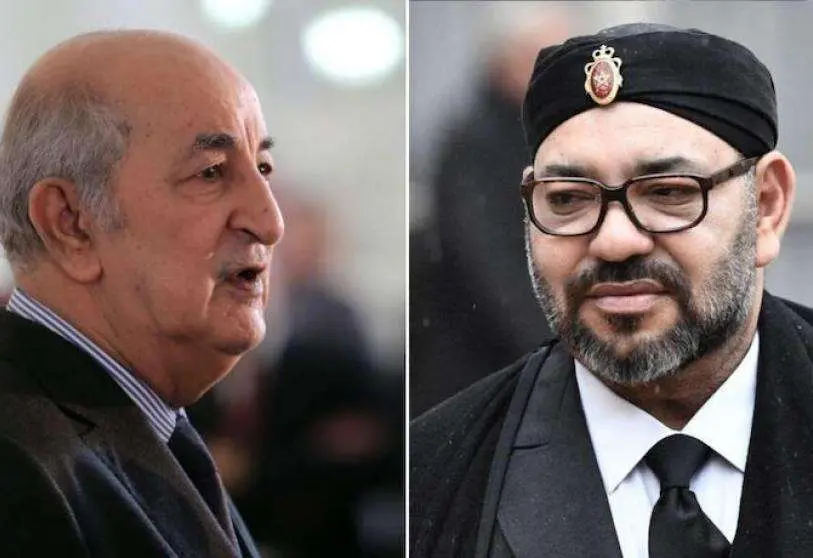Hidden interests prevented the meeting between Mohammed VI and Tebboune

The common objective for Algerian President Abdelmadjid Tebboune and Moroccan King Mohammed VI, taking advantage of the Arab League summit held on 1 November in Algiers, was to hold a direct and public meeting between the two heads of state. A meeting that would not necessarily put an end to the crisis between the two North African neighbours, but would show public opinion and the respective peoples of the Maghreb the will and need for dialogue.
This meeting has been prevented by hidden financial, political and military forces in both countries and in the major powers that sponsor the North African regimes respectively.
The success of the Algiers Arab Summit, convened in the name of "Arab unity" and "support for the Palestinian cause" (the latter had already achieved a "success" with the meeting of Mahmoud Abbas and Ismail Haniyeh, respective heads of the Palestinian Authority and the Hamas movement, in Algiers), depended to a large extent on two meetings between heads of state.
The first was between the King of Morocco and the President of Algeria, and the second between the Crown Prince of Saudi Arabia, whether or not accompanied by the President of the United Arab Emirates, and the Algerian leader. Both meetings were enough to show that there was the will and the capacity to unite the efforts of Arab countries. Without them, the summit was doomed to failure.
The Algerian president, host of the Arab League summit, was aware of this, and for this reason sent a personal invitation to both kings, which was delivered by emissaries in Rabat and Riyadh. Abdelmadjid Tebboune complied with the Protocols and counted on the presence of Arab dignitaries in Algiers to assert himself internally as a legitimate head of state, and externally as an emerging figure with the weight and authority to play an important role on the international stage.
Morocco's King Mohammed VI was also aware of the challenge, and not only agreed to attend the Algiers summit accompanied by his son Crown Prince Mulay Hassan (which for security reasons should not be done), but also personally contacted the highest dignitaries of the Gulf countries, Saudi Arabia, the Emirates, Kuwait and Qatar, to urge them to attend the Algiers meeting.
With his gesture, Mohammed VI considered the success of the Algiers summit and the strengthening of Abdelmadjid Tebboun's role as head of state and sole holder of constitutional power in the country to be a necessary premise for laying the foundations for resolving the bilateral crisis between the two main nations of the Maghreb, and achieving peace and prosperity in the region, with a consensual solution to the Western Sahara conflict. A rapprochement between Rabat and Algiers was the indispensable premise for reviving the Maghreb Union, which was in a deep coma but still exists on paper.
The attendance of Saudi Arabian Crown Prince Mohammed bin Salman and UAE President Mohammed bin Zayed al Nahyan failed in the end not only because of Algeria's rejection of their offers to mediate in the conflict with Morocco, but also because of Algeria's refusal to expressly condemn Iranian interference in the war in Yemen and in the Maghreb and Sahel region.
In order to achieve their original goals and make the Arab summit a success, Abdelmadjid Tebboune and Mohammed VI gave the appropriate directives to the governmental, presidential and palace teams. However, powerful hidden interests were mobilised in both countries and outside the region to prevent this.
The Algerian and Moroccan diplomatic apparatuses, in charge of logistics and the development of the different stages of the summit, failed to do their job. The Algerian and Moroccan teams led by Ramtane Lamamra and Nasser Bourita failed in their main task, which was to ensure that the meeting between Mohammed VI and Abdelmadjid Tebboune would take place and that the two would appear before national and international public opinion, whether or not they were holding hands. Both the diplomatic teams and the Foreign Ministers themselves responded to each other's real or supposed provocations, thus creating a rarefied atmosphere that in fact torpedoed the objective. Bourita and Lamamra spent more time on secondary problems of questionable importance in themselves, and in any case collateral, than on preparing for the meeting between the two heads of state. No "provocation", "blunder" or "exaggeration" on either side could justify calling into question the main objective they had been tasked with. Bourita and Lamamra did nothing more than implement plans and directives that were not in line with the objectives set by King Mohammed VI and President Tebboune.
The political-military power groups and lobbies hostile to the unity of the Maghreb, both in the countries themselves and in Europe, mainly France, and other major powers, exerted all their influence to ensure that "things remain as they are" and that the two North African countries continue to be in latent conflict. It could be said that both heads of state are at the helm of their great national ships, but they do not control their engines. The engine rooms are run by others.

